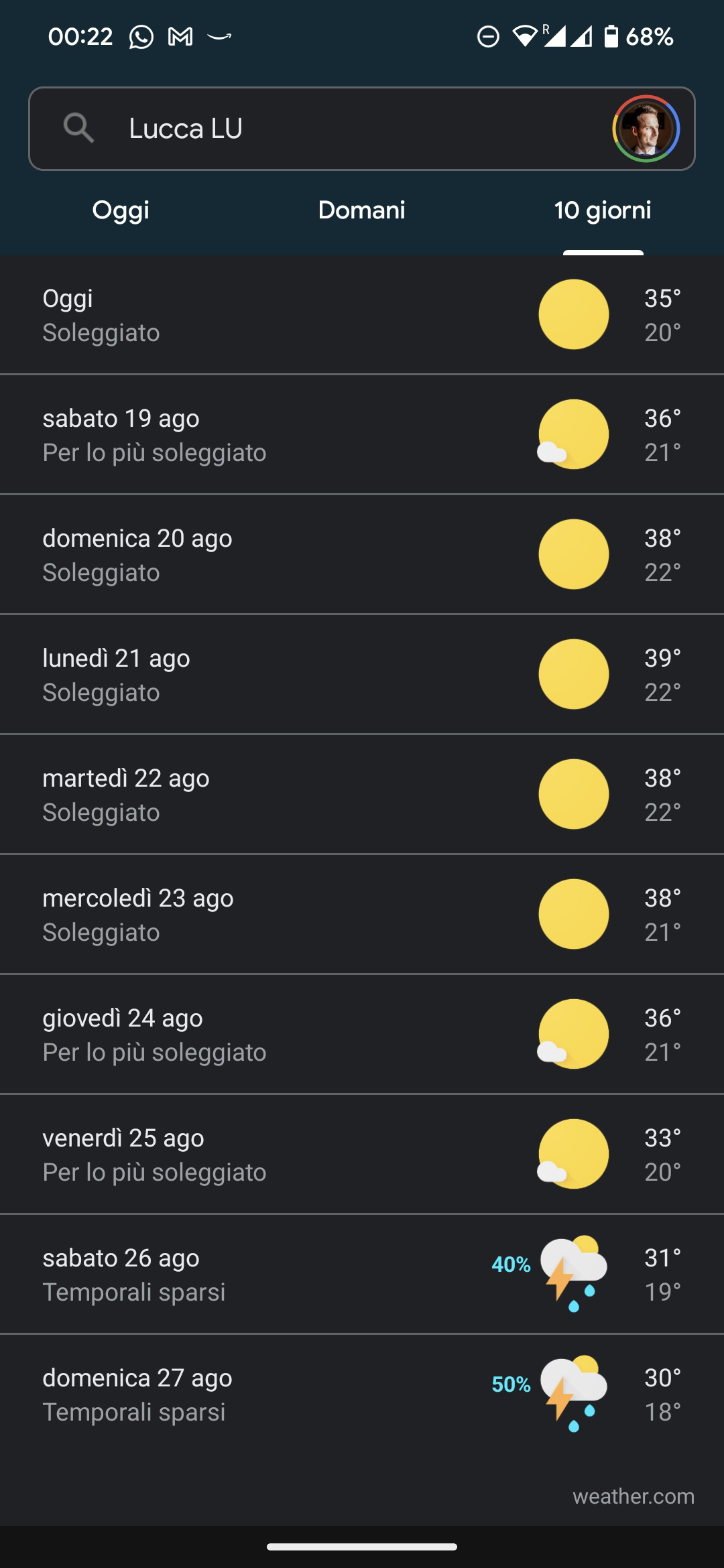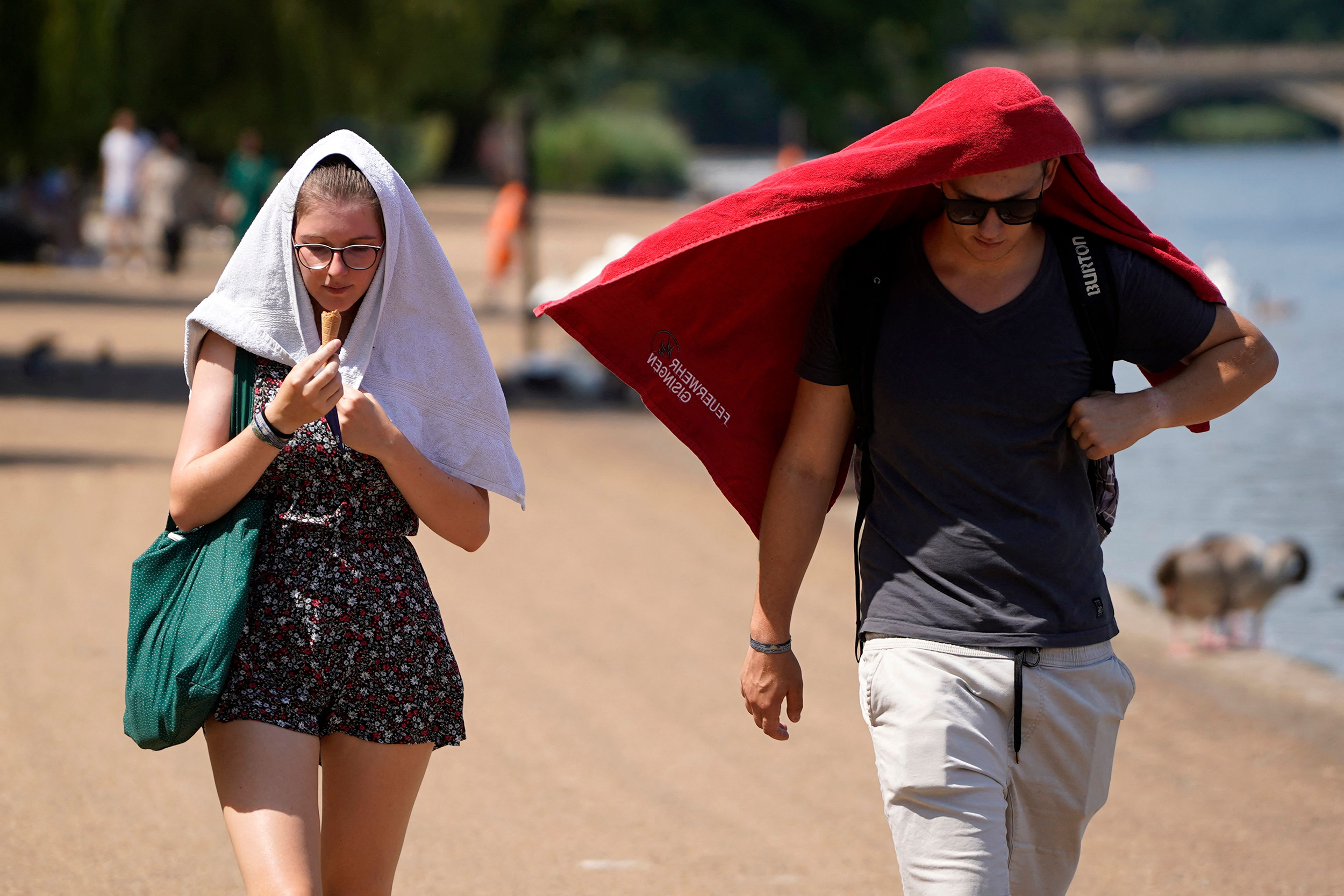That’s how they keep Americans away
Because for most of Europe, it wasn’t needed to have AC up until more recent years. You would have maybe what? 5-10 days a year that were actually really warm. People wouldn’t install an AC for that.
These numbers will drastically change the coming decades.
These numbers will drastically change the coming decades
which will only make things worse, since AC just moves all the heat from indoors, out, and uses energy to work of course.
What we really need is builders to start taking the extra heat in to account and designing accordingly (there are loads of different ways to physically control the temperature of a space instead of mechanically).
Shame that’ll never actually happen…Overall it’s still going to be a net saving as people switch from electric/gas heat to heat pumps and AC is just those but running in reverse.
And, of course, insulation. The reason we got away without AC is due to generally very large thermal mass of the exterior, you shutter everything in the morning to keep the heat out and when the temperatures drop again you open everything and let the air cool everything down. Thing is: In those recent waves there were plenty of nights where the temperature didn’t really drop.
Can you elaborate on that? European housing is built with a lot of focus on insulation and heat control, what are you referring to?
Buildings with all glass façades are an insulation nightmare. Cities need more water, plants and trees. Houses need can be built to favour shadow and fressness. You can even go anciant design that were naturally cooled and winded, like roman or African houses.
I don’t know about other European countries, but France housing is a disaster the last 40 years. It’s only been a decade at best that insulation is a consideration, but the quality is quite bad.
The big change that needs to happen soon is passive heat blocking for personal residences.
Most HOAs don’t allow a big extra wooden structure over the roof to block the sun; but they’re going to need to start to keep home prices up.
But HOAs are designed to make rule changes almost impossible. So I predict we’re going to see a lot of expensive neighborhoods become cheap ones in the next 15 years, due to their HOA not fkexing to support necessary heat control structures.
This is a hairbrained idea. Nobody is seriously considering building massive wooden structures over entire home just for shade. Just focus on cool roofs, solar panels, trees, and usual weatherization.
If the temperature stops going up every year, you’re absolutely right.
Big if, right now
European housing is built with a lot of focus on insulation and heat control
It’s more about also keeping heat out, as well as heat in. Which have overlap but are not necessarily the same thing. See this conversation for some more details.
Especially since some people are pushing for lower regulations on how to build houses in some countries in Europe. Yes, there is a housing crisis going on. But when we start to build weaker buildings because of that, we just make other problems worse.
That’s not true. While Northern Europe doesn’t really need aircon, Southern Europe is pretty bloody hot since the days of Christ. The difference is that European houses are built with insulation in mind, US houses are built from sticks and shit.
Not saying that is the case, but 20% of Europeans with A/C could also mean that 100% of the people in the very south have it and noone else.
You’re also wrong. Mainly, It has to do with the thermal capacity/mass of the building and not with differences in insulation values.
There are pros and cons for all building types.
I’m not wrong, sorry.
Wut? God, the worse from Reddit are already here…
Your houses would be built with the same materials if you had the earthquakes and tornadoes to deal with.
No.
The insulation requirements in the US are higher than many European areas with similar climates. Germany for instance would fall in region 4 and 5 of the US climate wise. R-30 is required for walls, R60 for ceilings, and R20 for floors for homes in the US. Germany recommends 6cm of wall insulation ~R8, 14cm for ceiling ~R19, and 6cm for the floor R8.
___You know if you muppets used sane units you’d be right. But you’re using colonial measurements.
Here’s conversion table. US R30 is equivalent to proper units R5.3, R60 is R10.5.
…and we don’t really have recommendations as such. KfW55 is nowadays mandatory for new construction, KfW70 and up gets you cheap loans. KfW70 means less than 45 kWh/m² per year for heating and they don’t really care how you achieve that. We didn’t really get around yet factoring cooling into stuff.
I was using freedom units for both. The R values were determined based on insulation thickness. Because you Europeans use energy consumption for your requirements it’s impossible to compare with US requirements. I did find this table giving recommendations for insulation.
Your numbers still don’t make any sense or are a century out of date or something.
The KfW also hands out loans to add insulation to existing buildings, U0.14 roof, 0.2 walls, 0.25 floor, so lowest R22.7 in Rankine land. The other numbers are for window, listed buildings, etc. All of that is minimum what’s actually recommended is well ask your architect and budget. There’s only so much that’s sensible to do when it comes to old construction as at some point hunting for air gaps and heat bridges is more bother than tearing the thing down and building new, and the KfW did set the standards sufficiently low so that currently uninsulated buildings at least get something and you can’t just tack on half a metre of insulation to an existing structure either. Mostly it’s the roof that’s missing insulation, walls tend to be defensible as they are and it probably makes more sense to upgrade the heating system.
You can back out R values based on insulation thickness, that table may be old… It didn’t have a date on it.
The values you provided equate to freedom R values of R40.5, R28, and R22.5 for the roof, walls, and floor. Those are inline or behind the US minimum requirements R60, R30, R20.
US houses are insulated depending on their climate zone.
Southern Italy peaks at 32C and low humidity. That is absolutely nowhere close to the heat we get in much of the US.
US houses are most definitely built with insulation in mind. That point is somehow more laughable than you not knowing your own temps.
Literally every part of your claim is incorrect.
Southern Italy peaked at over 50° C this year, and do you really think a country completely surrounded by an ocean has low humidity?
Yes, comparatively.
Also I assure you no one is making building code choices based on one year.
Dude, I’m in Tuscany which is nowhere near the peaks of southern Italy.
This is what awaits me

This matches my expectations pretty well
I said most of Europe, not all of Europe.
I’m well aware that AC is common to have in the south but then you’re talking about like 4 countries. Once you move north of those, it’s not all that common to have an AC in the house.
Wut? No one is using AC.
Yes but not necessarily in the way you think
Huh. I’m in the 12% of something
Gulf Stream
Gulf stream, more water around countries which evens out temperature changes, more insulation which prevents heat from getting in, more massive construction generally which also helps moderate temperature changes, and we probably have better building codes in general so stuff like ventilation doesn’t make things worse by letting the cold out.
Also most of Europe is significantly north of the USA so…yeah. Non-story.
Actually it’s mostly due to the construction materials and techniques used. American houses are generally less well insulated and built with the explicit expectation that there will be active air conditioning used to maintain the temperature.
Meanwhile in Europe this is not only comparatively very expensive to do, it is also largely unnecessary due to many buildings predating modern air conditioning, using good insulation and passive systems to maintain a comfortable temperature. There are also regulations on newly built houses that make it generally attractive to build energy efficient.
One thing I can promise you, even if it’s not 2x4 construction, those brick and plaster walls will turn a house into an oven over the summer even with judicious control of open windows. They just store up the heat for a night time that feels like noon day sun. Folks used to straight up sleep on their porches.
Signed,
A resident of an un-air conditioned brick and plaster house in the mid Atlantic currently sweating his balls offThat’s been a problem with climate change in the UK where air conditioning doesn’t really exist but we are starting to experience warmer weather than the houses were built for.
Most British houses don’t have any insulation, that’s why they suck. Try a new build and feel the difference.
I have a new build but it doesn’t allow the heat to escape on the heat we’ve experienced during the last couple of summers (this summer excluded).
Do you even understand how to protect your home from the heat? When it’s hot outside, your insulation protects you from the hear outside. But there’s a weak link - your windows. You MUST cover them completely during the day. And also you MUST keep ALL windows closed during the day. That will keep your home cool. Then during the night when the temperature drops, you should open your windows for ventilation and cooling.
Can confirm, so long as you have cool nights and insulated houses you don’t strictly need ACs, you can get by with opening all the windows at night and closing them (and closing the curtains) during the day so the cold is trapped inside.
I live in a new build and my biggest heating bill this winter was about above £60. I only have portable air con because I WFH and my giant 4K monitors heat up to +46 and just blast that heat into my face all day long. That’s awesome during the winter as I don’t have to heat my work room at all, but during the hottest days it becomes a problem. Other parts of the home don’t need air con at all. Was OK even during last year’s heatwave.
American houses are generally less well insulated and built with the explicit expectation that there will be active air conditioning used to maintain the temperature.
Well, that’s just silly and shortsighted. A well-insulated house will maintain its temperature more efficiently and require less active temperature control.
So that sort of mindset seems pretty on point for 'murica.
Source?
The North American Insulation Manufacturers Association (NAIMA) reported that approximately 90% of U.S. single-family homes are under-insulated and are wasting energy and money
European houses are typically built with masonry, while North American houses are usually made of wood.
http://masonrydesign.blogspot.com/2014/01/european-construction-versus-north.html?m=1
Then there are some design choice difference that also matters. In the US average ceiling height is around 9 foot. In Europe it’s 11. Open floor plans are more common in the US. It’s a trend coming to Europe but given the average age of a house in Europe it’s still relatively rare.
Yes, the USA has plenty of well built houses. No one is arguing against this. And the climate plays a bigger part why most of Europe doesn’t have AC. But the statement is still true. European homes are generally built without taking an AC into consideration and are trying to fix the issues in a passive way because of it.
The USA aren’t the worst offender either. Australia has it way worse. They have some of the worst insulation and are melting during summer and freezing during winter. Despite spending an ungodly amount on cooling and heating.
It’s very very common in the Northeast to not have AC in spite of the wooden construction and lack of insulation. No one in my family from upstate NY has AC. The climate is the vast majority of the reason there’s more AC in the US.
Hmm, my apartment building is mostly cinderblock and concrete, I have 12 foot ceilings, I’m on the first (above the entry) of five floors so hot air should rise away, and I have good double glazing with UV blocking film and screens. But mid-afternoon when that low-latitude Southern California sun hits, and the Santa Anas are blowing off the desert, even closing all the curtains and turning off appliances can’t keep it cool. So we set the AC for 77 and swelter until the sun goes behind the building across the street. And I make sure I get all the day’s cooking done in the morning so I’m not adding any heat. I’ve seen Europeans come and sunburn themselves because they think they know how long they can play in the sun but they haven’t met OUR sun. It’s just more direct.
I recently got all new insulation, central ac, ducts. Just getting new insulation helpped a lot but I dont how much is enough. The company just showed a chart and said this how mich is standard here. Yes it is an american home yes it is brick.
There isn’t one. The latitude isn’t the only reason either; the jet stream over the Atlantic moderates the European climate. Meanwhile in places like Minnesota and Buffalo you oscillate between -30°F with 48” of snow in 24 hours in January to 100°F with 90% relative humidity in August. If construction were poor and insulation was substandard, people would die.
Most of Europe doesn’t have a/c for the same reason a lot of Seattle and SF don’t — it’s never been necessary.
So is Canada, but it has 64% of homes with air conditioning.
Also, maybe it’s just me, but like didn’t England, France, Spain, Italy and southern Germany all hit like 100f (38c) or higher this summer (and other summers before that)?
It’s less of a story and more a telling sign that climate change is having a direct impact on humans that it’s becoming more and more necessary for people in even European, Canadian and even PNW climates to adapt and outfit houses and businesses with them.
Southern Germany didn’t hit 38.
The main reason is how people build houses. In Europe, people use different meterials (bricks, mortar, concrete, etc.) which insulate and put on top insulation. Walls are thicker too. The good insulation keep the heat outside.
The other is the law. Europe has regulations on AC. For example, if I want AC in my house, I must compansate the electricy consumption with renewable.
Most of the American homes i have lived in are brick homes.
Not arguing about which is better but most American brick homes you see are a brick veneer, still renting on plywood, studs, and Sheetrock for the actual wall.
So what make a brick home a brick home
I think most people here are talking about the structure being provided by the brick/blocks. Typically they’re much thicker and heavier and provide structure and some insulation.
Well the American style would provide insulation. It is still bricks just with fiberglass insulation and other wall parts
You’re part right and part wrong:
While building with different materials DOES change insulation, that doesn’t mean it always makes the buildings cooler.
On the contrary, building with bricks, as is standard for all year residential buildings throughout most of Europe is a way to trap and detain heat, NOT a way to keep heat out.
You see, the greatest temperature difficulty before anthropogenic global was the outside being too COLD, so that’s what we’ve been building for and because of that, AC hasn’t been as necessary.
Nowadays though, the heat retaining structures with no AC are becoming unbearably hot for much of the year. We desperately need environmentally responsible AC.
That’s nonsense. Insulation works both ways. It doesn’t differentiate if outside is cold or hot. A well insulated house will keep you warm during winter and cool during summer.
It has to be cold inside to begin with. Much of the US has night time lowes over 25 in the summer, with daily averages of 30. So a uncooled home will never be near that. Allg homes should be well insuladed, but just like it would be mad do hgae no heat in much of Europe, its similarity not realistic to have no cooling in much of the us.
https://weatherspark.com/y/8813/Average-Weather-in-Dallas-Texas-United-States-Year-Round
My house is very wel insulated. It doesn’t take much energy to keep it at a nice temperature in winter.
In summer though, it can get very hot inside. The reason is that I have some fairly large, south facing windows. And once it’s hot inside, it’s very hard to cool it down again.
I should really invest in some blinds, preferably outside, to keep the sun out during hot days.
But the point is that insulation and keep heat in/out is not perfectly symmetrical.
Without outside blinds, the insulation doesn’t work. The windows work as a greenhouse effect and will quickly heat your house.
Then, the insulation will work keeping the heat inside.
I did mention that in Europe, we close our outside blinds during the day.
Mate, you might as well complain your house is too hot because you run the heating all summer. Your insulation is working fine, you’re just nerfing it by not keeping the sun out.
Well, your problem is the sun going through the windows. They completely defeat your house insulation. Yes, you need blinds, they help a lot. Preferably, outside mounted. Like in Southern Europe. If you cannot mount them outside, look for pleated blinds. They not only your room protect from the sun, but also work as an additional insulation layer. You can also close them during winter nights to save a bit of energy.
Ottawa is on the same latitude as Venice so it’s not like canada is very northly (though i know canada has a much more varied temperature range). That aside i think there are many reasons, like the southern countries are not as wealthy as US and theres a culture of using other methods to survive the heat such as building colors, not paving every cm^2 of land etc. And if we look at more northen Eu countries like where I live (sweden) the highest ever measured temp is 38c (100.4f). So anyone here who needs an AC for the few days when the temp is above 25c is a card carrying bitch.
Are you fucking high?!? 38° is a hot summer day in Europe. Thats 100.4° F. When I lived there I hated life. Mosquitoes outside my window without a screen, so a breeze was out of the question. No A/C inside so breathing was also out of the question. I eventually found reprieve in the form of a 5” fan sold to me by an old man.
Point is, celsius or fahrenheit, its fucking hot
The climate of Europe is a lot warmer than in America for the same latitude
Winters are warmer, summers not so much.
Is that really true?
I can’t speak for all of Europe, I just don’t know. But Northern Europe definitely has warmer summers than areas at a comparable latitude.
I live in a part of Sweden that’s at a comparable level of Siberia. I promise you our summers are much warmer.
Yes, I think you underestimate Siberian summers. Here are three places with (fairly) similar latitude and identical summer temperatures, but nearly 20°C difference in winter: https://weatherspark.com/compare/y/84156~146168~148978/Comparison-of-the-Average-Weather-in-Stockholm;-Gillam-Man.;-and-Surgut-International-Airport
Damn. Cool! Thank you, you do indeed seem to be correct!
wait until you learn about the gulf stream
you basically have to move Houston to Madrid for temperatures to be comparable by latitude
wait until you learn about the gulf stream
nothing we’re not about to remove from the calculation
Climate change is a thing and it won’t matter how far north you are, the heat’s going to kill you.
Get some damn air conditioning.
It’s very expensive though.
And will only get more expensive.
Everyone having AC is a good way of accelerating climate change
It’s preferrable to heat stroke
Having lived in Germany for a year, no. It gets hot in the summer. It’s hard to concentrate while at work when there isn’t even a fan. I don’t get it. It would make economic sense for businesses like the software house I worked for, on productivity loss alone.
The average high temperature for Germany in July is 77°f
The average high temperature in the state of Georgia in July is 89°f
I’m Brazilian. I don’t know what the average temperature is in Brazil in freedom units, but I know I can function there during summer because of AC. In Germany in 2007 I was basically just starting at a computer screen while sweating without much to show for it.
Haha. Average. I live here in GA and while the average may be 89 i havent seen a temp below 90 since june. Its more like a 95 average recently.
Two different climates too. USA is centred closer to the equater then all of Europe, which means more people live in year round heat, and want A/C to cool off.
Right? People forget this all the time and say “just open a window you baby” bitch it’s been 100+ (37c) every day for three months here, %50 humidity minimum. Our overnight lows are your daytime temps.
Even water temps in bays in FL have been pushing to 100F
Well, yes. Until people caused climate change, we didn’t need air cooling systems. Depending on where you lived, you need to build to keep heat IN buildings, even.
But, here we are, a planet on fire. So now we need air cooling to survive, lest our weakest, elderly, infirm, young children die. Then down the line once it’s even worse, it’ll be needed just so that any of us can survive.
Feck the bourgeoisie and the generations of apathetic fools under them that have allowed this to happen :-(
deleted by creator
Let’s see your efforts.
“no but u” is the best you can come up with? Really?
I’m not whining on the Internet because I expect everyone else to save me. Either step up or shut up.
But thanks for confirming your total lack of self awareness.
Well, if you are going to call someone out, at least have a list of things you do.
Using some of the examples from my own life: I use public transit or bike. I don’t own a car. I grow vegetables in my yard. I make a conscious effort to recycle and reduce my waste. I saving to upgrade my heat from oil to much more sustainable technologies. I don’t use a powered tool where a manual will do, and if I have to use a powered tool I stay away from fuel powered ones.
Now, what are your efforts?
Exactly. It’s not the corporations, it’s us. Corporations are innocent and have no control over our decisions at all.
No wonder they’re more worried about climate change /s
As someone who struggled to sleep in sweat soaked sheets in a small hotel in France can they at least give you a fan?
You could use a fan, sleep without a blanket or sleep hugging a water-filled water bottle. The latter two is what I generally do on warm days (or use a really thin sheet if it is not too warm). Also keep the windows open at night so the house can cool down before the sun rises and starts irradiating your walls and roof.
Too dangerous. Could cause fan death
Korea has entered the chat
88% of Americans have AC? Because here in Canada it also feels like 20%, if not lower.
Canada is of a similar latitude to Europe so it’s cooler.
True but climate change has made Canada very hot the past few years. I live in the west where we had a heat dome in 2021 that reached nearly 50C and burned down an entire town.
The capital of Northwest Territories is currently on full evacuation from wildfires.
Believe me, I know. I spend a lot of time in the Pacific Northwest so I’ve felt heat without AC. In just explaining why homes have traditionally not had AC.
Are you on your 43rd consecutive day over 100°
(BC Lower Mainland) I installed a heat pump in my main living area last year and by god it has been my best investment in years. Hydro bill dropped and I’m very comfortable all year round. Can’t believe how long I put up with not owning one.
For those that need a geography lesson to explain: https://vividmaps.com/comparing-latitude-of-europe-and-america/
And for those now suddenly wondering why Europe isn’t even colder than it actually is, the answer is that the Gulf Stream brings a lot of heat. Also, the reason why it hasn’t historically tended to get as hot as the American upper midwest/great plains during the summer is that the rest of the water surrounding it, such as the Med and the Baltic, helps moderate the temperature (as opposed to the “continental” climate of the midwest).
Aren’t heat pumps a cleaner, better alternative to traditional AC?
Thanks everybody for your input 😉 Now I know the differences!
Yes. And many homes in Europe have them. US term for them are split AC systems.
The technology behind them works exactly the same, only that usually the direction of heat transport is reversed. So at least the “cleaner” part depends largely on the chemicals used, not whether it’s an AC unit or a central heat pump.
Heat pumps ARE AC. Also your fridge.
Air Heat pumps are AC.
There are different types which uses earth or water body heat and are even more efficient but expensive.
Technology wise they are AC though
And (multi-)split wall mounted ACs are among the most efficient heat pumps as well with SCOPs above 4.5. It’s frustratingly little-known or talked about (in central Europe anyway), because these devices would also be a much cheaper and more efficient heat-pump upgrade for older buildings that don’t have low temp supply-water heating and would normally need to be completely gutted to install floor heating or large radiators.
While being the cheapest, AC is also the type of heating with the least amount of comfort, while the most expensive solution, underfloor or wall heating is the best comfort. Radiant heat is much less intrusive than blowing air around violently.
You can install heat exchange unit. It will work as AC to cool you down and it will also heat your water and underfloor system. More advanced units can also be supplemented by gas/electricity when heat pump part is not effective (usually on very cold days).
That being said I think it also has its perks like the forced convection heats up a cold room much quicker and in a bathroom it assists drying surfaces or clothing on a drying rack (to stick with European customs). Meanwhile floor heating is extremely slow with some annoying side effects like it basically doesn’t react to noon sun shining into a room and heating it up or stuff like that.
But I’m not going to argue that comfort wise floor heating is far superior.
I agree. One thing I’d like to add: There are also low thermal mass floor heating systems available nowadays (usually dry, built on top of a layer of Insulation). These aren’t that slow to react. But of course, these bring not only advantages but also drawbacks.
A heat pump is just an air conditioner that works both ways (it can pump heat into or out of your house).
In the US, most people just buy air conditioners because natural gas furnaces cost less to operate than heat pumps.
The move to renewables and rooftop solar is making heat pumps more attractive than the conventional AC + furnace, but nothing about a heat pump is more efficient than an AC in the summer because they are fundamentally the same thing.
Where heat pumps are a big efficiency win is in places without natural gas. Assuming your winter weather doesn’t get too cold, pumping outside heat into your house uses substantially less electricity than resistive heating.
I’m in the UK and I am currently buying a house, I looked at hundreds and the one I am buying is the only one with built in AirCon, Only to 1 room though. It really is rare here, I have a portable unit but it isn’t that good, I think these are what many people have but actual built in air conditioning is in my experience very rare.
It’s expensive to add and the cost is per room… plus portable isn’t that bad for the couple of weeks of actual warm weather.
I can’t even have portable as I have no opening windows in the main room… would have to fix that first. Luckily insulation works both ways and it doesn’t really get that hot in here yet.
What is the average age for a house there? I’m guessing the cost of central air installation (duct work) vs sticking a window unit in is the issue. Then there is the cost of electricity so just cooling one room at a time will be cheaper.
They are often quite old… http://www.historicdoors.co.uk/blog/englands-building-age-infographic/
The older ones (Like the one I am selling) are built like big heat sinks, The intention is that you always have the coal fire burning in the day I think and the whole building stays warm over night. However in the very warm weather we get now these houses are not so great.
It wouldn’t surprise me if that changes over the next few years.
They don’t need it. Saves energy
Yeah, until recently we didn’t need it.
hotter weather literally everywhere more often says you are a purposefully obtuse buffoon














